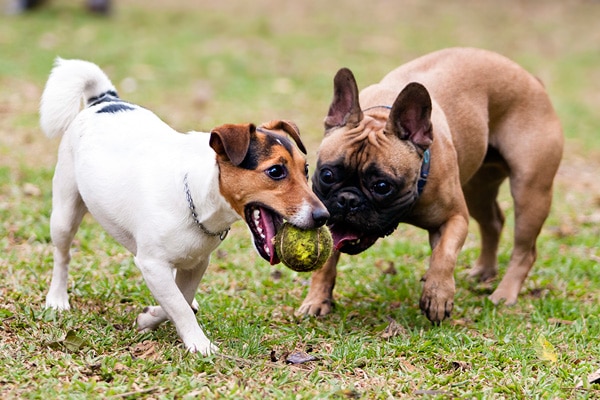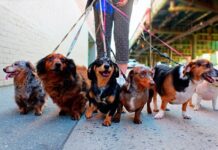Whether you live in a natural environment surrounded by different animals or in the city or suburbs, you should pay particular attention to properly socializing your puppy or adult dog.
Socialization will help your dog live peacefully in his environment, respect people and other dogs, to not be aggressive and above all to not be scared. It’s such an important process that the majority of behavior problems in adult dogs stem from poor socialization when they were puppies.

What is socializing a dog?
To put it briefly, we could say that it’s the way to teach your puppy or adult dog to live in his environment, respecting other animals and humans. Socializing is how we define the act of entering into society, and it’s a really important process that we should all follow.
It should be done when they are puppies, after they have gotten their shots to avoid unnecessary risks. While socializing your puppy, he’ll come into contact with other animals, which is why it is mandatory that he have all the necessary vaccinations before going out on the street.
Your puppy or adult dog should socialize with other dogs and different animals, as well as humans, of course. The difference between a friendly, respectful, well-trained dog and an aggressive dog isn’t just in training, but also in how he has been socialized throughout his life.

How do you socialize a puppy with other dogs?
When you go out to walk your puppy, you should go to areas where there are other dogs so he can interact with them. If you are worried that the adult dogs might hurt him, you can check with the owners beforehand to ensure that they aren’t aggressive.
The best age to start socializing a puppy is starting from 3 months old, both with other dogs as well as adult humans and children.
Dogs meet and greet each other by smelling each other’s private parts. They will sniff each other’s butts and genitals and occasionally will even lick them. This is something completely normal that you should allow your puppy to do; it’s his way of introducing himself to other dogs.
The best way to socialize your puppy is to let him meet other dogs, play with them, and even fight a bit. They mark their own boundaries and have warning signals when your dog does something they don’t like (they’ll growl a little), so you should simply let nature do its job.
It’s also highly recommended to invite friends with puppies and adult dogs to your house, where obviously your puppy will also be. Your puppy should understand that other dogs can come into the house and he should meet and play with them.
Contact with dogs of different ages and breeds will teach your puppy to respect other dogs and live peacefully with them.

How do you socialize a puppy with people?
It’s just as important for your puppy to learn to live with people as with other dogs. You should ask other dogs’ owners and your friends to pet and play with your puppy.
Even if you have children, you should let them play with him (but always under your supervision). Your puppy should learn to be touched and petted by strangers in the same way he lets you.
Asking friends and family members to come to your house regularly is an excellent practice to help socialize your puppy and have him understand that anyone you invite can come into the house. This is very important to prevent him from becoming territorial in the future.
Walking through areas of the city where there’s a lot of traffic and noise can help your dog be less afraid, but this should be done gradually do avoid traumatizing him.
Puppies are very prone to chewing on everything and occasionally may bite your hands. They’re doing it playfully, so you shouldn’t get mad at them, but you should teach them how to play with their toys and not bite people.

What are the most common mistakes when socializing a puppy?
Many people hold their dogs in their arms or pull them away when passing bigger dogs while out for a walk… this is a huge mistake that will reinforce your dog’s fear.
Other people simply don’t let their dog or puppy sniff other dogs’ butts and genitals.
This is another big mistake that will make it so that your dog can’t socialize properly.
Some people don’t even let their dog play with other dogs because they bite each other’s necks and sometimes yelp a bit. When dogs play, it’s normal for them to nibble each other and even inadvertently hurt each other a little. You have to let them play and learn to have their own boundaries; otherwise, you’re making another big mistake in their training and socialization.
You should never scold your puppy or adult dog for trying to meet other dogs or for playing with them, let alone going to greet them. However, it is advisable to scold or correct your dog when he acts aggressively to show him that that behavior isn’t acceptable.

What happens if my dog isn’t socialized?
Lack of socializing or bad habits during socialization will result in your dog not respecting other dogs or people and making him afraid. A scared dog can become a very dangerous dog, since fear can push them to behave aggressively.
Many problems with aggression, fear, excessive barking, etc. etc. etc. are all a product of poor socialization when he’s young. Dogs should enjoy the company of other dogs in complete serenity (although there are always some dogs they will get along better with than others, which is something natural).
If you have a dog who isn’t socialized, you should try to socialize him yourself by following the advice here, or go to a trainer so he or she can help you with the process.

How do you socialize an adult dog?
Before trying to socialize an adult dog, you need to find out if the dog has aggressive tendencies or not. If he’s a little aggressive and you know he could bite other dogs or people, he should always wear a muzzle while practicing. An adult dog is considered any dog more than 12 months old.
It’s highly recommended to take long walks through areas where there are people walking or working and other dogs walking. Try to get close to other dogs who are walking so they can smell each other. The best way is to approach slowly but without being afraid, since your dog can detect your nervousness.
When your adult dog shows a positive attitude with other dogs, reward him with a natural dog biscuit or whatever treat you normally give him, fruit for example. If, on the other hand, he has a nervous or aggressive attitude, back away calmly until your dog calms down.
You should walk near dog parks, but don’t let him off his leash. Just walk around the outside so your adult dog can see other dogs and occasionally greet the ones that come near the fence. If your dog greets them without being aggressive (if he tries to smell them), give him a treat so he learns to associate this with positive behavior.
You can ask a friend who also has a dog to go for a walk with you. This way, your dog will learn to walk with another dog and copy the behavior of a dog who is well-socialized.
It’s a slow process, but if done properly will offer huge benefits to your adult dog, since you’re teaching him how to live in society. When your dog shows signs of being friendly, you can let him interact with other dogs and play with them.
You should avoid at all costs the use of balls, sticks or toys, which can create tension between dogs. Some are very possessive with their toys and they can make the situation worse instead of better. Nevertheless, if you find yourself in over your head, you can ask a dog trainer for help.





